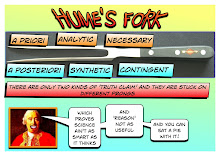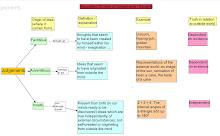We read Section 3 - 4, of David Hume's 'Enquiry Concerning Human Understanding'. It is the 'billiard ball' bit and it's about causation and inductive reasoning.
The fact that these ideas seem counter intuitive (seems daft) is the whole point. Hume points out that 'custom' and 'habit' has a very strong grip on our ways of thinking and this is why we think there is a law or 'principle' of cause and effect operating in the physical world.
What we need to grasp is the difference between:
1. predicting that event ‘A’ will be followed by event ‘B’ just because it always has in the past
and
2. believing we have uncovered a ‘law’ of the physical world that says event ‘A’ will always be followed by event ‘B’ regardless of the time, circumstances (and universe) that those events occur in.
No one (certainly not Hume) is saying that we shouldn’t use our ability to predict and control the world through the knowledge we gain through experience, but we must not formulate laws based on what are always limited observations of ‘recurring phenomenal patterns’. In other words however many times you observe a billiard ball striking another it will never be enough to conclude or infer that the second ball will always move.
To do so would be to use induction or inductive reasoning. Induction works like this:
- All the ice I have ever touched was cold, therefore all ice is cold.
Or
- All the one billion billiard balls struck with a cue moved, therefore all billiard balls move when struck with a cue.
It is to taking particular events and making them the basis of universal laws. You might think this is daft, but even Stephen Hawking agrees! He says, "No matter how many times the results of experiments agree with some theory, you can never be sure that the next time the result will not contradict the theory."
Finally we must be careful not to confuse induction with deduction. Wikipedia explains something like this:
Deductive reasoning, sometimes called deductive logic, is reasoning which uses deductive arguments to move from given statements (premises) to conclusions, which must be true if the premises are true.[1] An example of deductive reasoning, given by Aristotle, is
▪ All men are mortal. (major premise)
▪ Socrates is a man. (minor premise)
▪ Socrates is mortal. (conclusion)
So, we can see that deductive reasoning moves from a general principle to a particular example, whereas inductive reasoning moves from a particular example to a general principle.




















.jpg)







1 comment:
i been on xmas holiday 2 long coz that made my brain hurt lol
Post a Comment